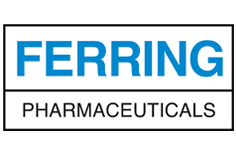Ongoing extension study results provide further evidence for first-line use of FIRMAGON® (degarelix) in advanced prostate cancer
Vienna, Austria – Monday 21 March 2011 –
Recent data from the ongoing five-year FIRMAGON® (degarelix) extension study (CS21a) has demonstrated the long term efficacy and tolerability of FIRMAGON® in study patients with advanced hormone-dependent prostate cancer and support its use as first-line androgen deprivation therapy.1 Full details were shared today at the European Association of Urology (EAU) 2011 Annual Meeting.
FIRMAGON®, a gonadotropin-releasing hormone (GnRH) receptor blocker, is indicated for the treatment of patients with advanced hormone-dependent prostate cancer. The extension study of the pivotal FIRMAGON® vs leuprorelin trial (CS21) was designed to collect extended safety and tolerability data on FIRMAGON®. Following the close of the Phase III trial, all patients were offered the option to receive FIRMAGON® as part of the extension study.All patients who had received FIRMAGON® continued with their treatment and those who had previously been treated with leuprorelin (a GnRH agonist) were re-randomised to receive FIRMAGON® 240/80mg or 240/160mg.
To date, data from the extension study show that all patients receiving FIRMAGON® experienced improved PSA control, specifically:
- Beyond one year, prostate-specific antigen (PSA) suppression was maintained in patients continuing treatment on FIRMAGON® 1,2
- After switching to FIRMAGON® patients who initially received leuprorelin experienced:
- Improved PSA control (0.20 vs 0.08 events/year; p=0.003)1,2
- A significantly lower rate of PSA failure or death1,2
- Tolerability of FIRMAGON® was maintained throughout the extended study period1,2
About FIRMAGON
FIRMAGON® has unique chemical characteristics and a novel mechanism of action, different from traditionally used hormonal therapies. Administered as a subcutaneous injection, FIRMAGON® rapidly reduces levels of prostate specific antigen (PSA) within two weeks by immediately blocking the GnRH receptors in the pituitary gland. Blocking the receptors suppresses the release of the luteinising hormone (LH) and follicle-stimulating hormone (FSH), resulting in a decrease in production of testosterone by the testicles to castration levels within three days. Prostate cancer is dependent on testosterone for its growth, and reducing testosterone levels slows the growth of cancer cells.
In clinical studies, FIRMAGON® suppressed testosterone and PSA faster than leuprorelin, an existing treatment for advanced prostate cancer.3
In clinical trials FIRMAGON® was generally well tolerated. Common side effects are hot flushes, injection site pain and erythema, increased weight, nasopharyngitis, fatigue and back pain.3,4
About Prostate Cancer
Prostate cancer is the most common form of male cancer in the western world,5 and the second leading cause of cancer death in men in some countries.6 In 2008, around 338,000 men were diagnosed with prostate cancer in Europe and 258,000 men died from prostate cancer.7 Worldwide, 913,000 men were diagnosed with prostate cancer in 2008 and more than two out of three cases were diagnosed in the more developed regions.7
For further media information and news alerts on prostate cancer please visit Ferring’s information websitewww.ProstateCancerLiving.com
About Ferring
Ferring is a Swiss-headquartered, research-driven, speciality biopharmaceutical group active in global markets. The company identifies, develops and markets innovative products in the areas of reproductive health, urology, gastroenterology, endocrinology and osteoarthritis. In recent years Ferring has expanded beyond its traditional European base and now has offices in over 45 countries.
To learn more about Ferring or our products please visit www.ferring.com.
For more information, please contact
Sarah Stanmore
Tonic Life Communications
+44 207 798 9906
sarah.stanmore@toniclc.com
Helen Swift
Tonic Life Communications
+44 207 798 9924
helen.swift@toniclc.com
Patrick Gorman
Ferring Pharmaceuticals
+41 58 301 00 53
patrick.gorman@ferring.com
References
- Tombal, B, Schröder, F, Miller, K et al. Long-term prostate-specific antigen (PSA) control in prostate cancer: continuous degarelix or degarelix following leuprolide. EAU 2011, Symposium Abstract 1088. 26th Annual EAU Congress, Vienna, 18-22 March 2011.
- Crawford, ED, Moul, JW, Shore, ND et al. Switching from leuprolide to degarelix vs continuous degarelix treatment – effects on long-term prostate-specific antigen control. J Urol 2010; 183 (Suppl): e262, abstract 670
- Klotz L, Boccon-Gibod L, Schröder FH et al. The efficacy and safety of degarelix: a 12-month, comparative, randomized, open-label, parallel-group phase III study in patients with prostate cancer. BJU Int. 2008;102(11):1531-1538.
- Van Poppel H, De La Rosette JJ, Persson B.E et al. Degarelix Study Group; Long-term evaluation of degarelix, a gonadotrophin-releasing hormone (GnRH) receptor blocker, investigated in a multicentre randomised study in prostate cancer (CAP) patients. Abstract (23.) Euro Urol Suppl 2007;6(2):28
- University of Iowa Hospitals and Clinics. Available at: http://www.uihealthcare.com/topics/medicaldepartments/urology/prostatecancer/index.html [Accessed 16 February 2011]
- American Cancer Society. Available at: http://www.cancer.org/Cancer/ProstateCancer/DetailedGuide/prostate-cancer-key-statistics [Accessed 16 February 2011]
- Cancer Research UK. Available at: http://info.cancerresearchuk.org/cancerstats/types/prostate/ [Accessed 16 February 2011]

